The Checker Maven
Jump to navigationUncle Ben's Porch: An Argument with Mom

I had a bit of an argument with Mom this morning, and that's never a good way to start off the day. It was Saturday morning, and nearly every Saturday for more than a year I'd gone over to Uncle Ben's for a couple of hours, to sit on his porch, drink his wonderful lemonade, and learn something new about checkers.
But Mom had said that we're two months into a new school year, I'm in fifth grade now, and I need to spend a few extra hours hitting the books, as I hadn't exactly gotten off to a good start in English and math. Besides, she said, you can't be bothering Uncle Ben all the time; the elderly gent can't be expected to entertain children every single week!
I pointed out that Uncle Ben seemed to really look forward to my visits and that he might be disappointed if I didn't show up. Besides, I said (repeating back a few lines I'd heard from Uncle Ben himself), checkers helps a student with logical thinking and the application of reason. (I'm glad Mom didn't ask me to explain what all of that really meant, though.)
After a little while Mom relented and let me go, with a final caution to not stay too long and wear out Uncle Ben's patience or hospitality. Still, I didn't feel very good about the whole incident, and when I arrived at Uncle Ben's and sat down in one of his porch chairs, I couldn't help but blurt out the whole story.
"Well, Tommy," Uncle Ben said after hearing me out, "listening to your Mom and doing as she says is very important, and I shouldn't discourage you from doing so."
At these words, my heart started to sink and I was sure Uncle Ben was going to send me straight home. Certainly, he realized this as he added, "No, no, Tommy, I'm not going to send you off. But we need to make a little deal, one that you need to tell your mother about when we've shaken on it."
"Deal?" I said, unsure of what was coming.
"Yes, a nice gentleman's agreement. The one part of the deal is that you can come here and visit every Saturday that you wish ... but the other part is that your grades have to all be above whatever mark your mother decides. So if she says that you have to have nothing less than a 'B' in every subject, then you have to do that well in school," Uncle Ben concluded.
"But ... but ...." I stammered.
"No 'buts', Tommy! I know, you're worried that your mother will ask you to get all "A"s or something really hard. But I know your mom and I know she'll be fair about it. She'll just expect you to do your part. So, is it a deal, then?"
"Yes, sir," I said, and we shook hands on it. Uncle Ben was right, Mom would be fair, and I did want to keep my grades up, though I knew it would be hard work.
"Well then!" exclaimed Uncle Ben, "all this business talk makes a man thirsty!" And before you could blink twice, Uncle Ben had placed glasses of frosty lemonade on the table in front of us, and turned his attention to the checkerboard.

"You've been coming along fast," he said, "and so today we're going to try something a little harder. It's a bit like school; as you move up in grades, the work gets harder, but you learn more and more all the time. What do you make of this? Here's one in which whoever moves first will win."
This was the position Uncle Ben had set up for me.

WHITE
Either to Play and Win
W:W20,21,23,32:B1,10,12,13.
I took a long, careful drink of lemonade, and all at once, everything seemed clear. "Hey, Uncle Ben, I've got it!" I said proudly, and began to move the men to demonstrate the solution.
What do you make of this problem? Work it through and then click on Read More to see the solution, a sample game, and a large helping of additional illustrated examples.![]()
Solution
Editor's Note: As we point out each time, Uncle Ben's Porch is a fictitious and fanciful depiction of the retirement years of the great checker writer and teacher Ben Boland, and makes use of material from his classic work Familiar Themes in the Game of Checkers. This is an ambitious project and we would be grateful if you would bring any errors to our attention at editor@checkermaven.com.
Game--- 10-15, 23-18, 7-10, 27-23, 3-7, 24-20, 9-14, 18-9, 5-14, 22-18, 15-22, 25-9. 6-13, 29-25, 10-15, 25-22, 15-19, 23-16, 12-19, 32-27, 8-12, 27-23, 4-8, 23-16, 12-19, 22-18, 8-12, 18-15, 11-18, 26-23, 18-27, 31-15, 7-10,15-6, 1-10, 30-26, 10-15, A---26-23---Forms No. 3. A---Loses; 26-22 would draw. From "Cousins' 1000 Best Games."

WHITE
Either to Play and Win
W:W20,21,23,32:B1,10,12,13.
1. F. W. Drinkwater, No. 39 E. D. P. Vol. 1, 1878. With Black to play: 10-15, 32-28, 1-6, 28-24---A, 6-10, 21-17, 13-22, 23-18, 12-16*, 18-11, (20-11, 22-26), 10-15 B. wins. A---23-19, 15-24, 28-19, 6-10, 20-16, 10-15. B. W. Also No. 279 L. P. Bk. With White to play: 23-18 1-5 32-27 5-9 27-23 White wins.
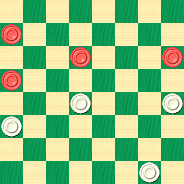
WHITE
White to Play and Win
W:W18,20,21,32:B5,10,12,13.
2. F. W. Drinkwater, No. 133 G. P. Bk. Same as No. 1 at 2nd move color reversed. A note is given that it was an ending with a Mr. Webley. This same ending came up in a 1936 game between A. Guenther and Finley, the latter missing the win at 6th move *21-17.
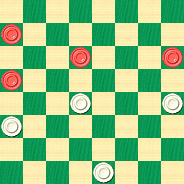
WHITE
White to Play and Win
W:W18,20,21,31:B5,10,12,13.
3. J. Smith, Northern Leader, 1888, No. 51. B. D. C. This is the same as No. 2, but man on 31. Here 31-26 or 31-27 can be played. Color reversed. This was an end-game from the Laird and Lady. Pos. may also be found as No. 132 D. R. Vol. 1, 1925.
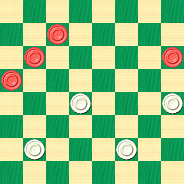
WHITE
White to Play and Win
W:W18,20,25,27:B6,9,12,13.
4. W. J. Wood, No. 91 Mitchell's Ck. Bk. 25-21, 6-10, 27-23, 12-16, 20-11, 10-15, 21-17. as above.
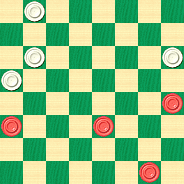
BLACK
Black to Play and Win
B:W32,24,21,20:B13,12,10,1.
5. S. Douglas, No. 121 New Ckgram. June 1934. 10-15, 32-27, 1-6, 27-23 as above.
RELATIVE POSITIONS
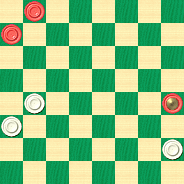
WHITE
White to Play and Draw
W:W17,21,28:B1,5,K20.
G. H. Slocum, No. 17 W. P. Bk. No. 791 D. W. Vol. 16, 1900. 17-14, 1-6. 21-17, 20-16, 28-24, 16-11, 24-19, 6-9, 19-15, 11-18, 17-13. R. W. Vance shows another Var. in No. 45 Wood's Study No. 6.
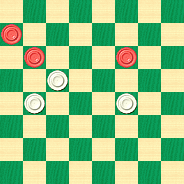
WHITE
White to Play and Draw
W:W14,17,19:B5,9,11.
N. Alist (Atwell) No. 50 Atwell's Sc. Drs. 19-15, 11-18, 17-13 as above, but 11 is not a king, hence 14-10 draws also.
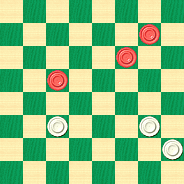
WHITE
White to Play and Draw
W:W22,24,28:B8,11,14.
J. W. Jacobson, No. 99 Atwell's Sc. Drs. 24-19, 8-12, 28-24, 11-16, 22-18 as Grant McGuire et al.
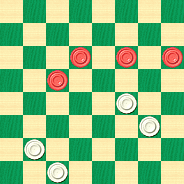
WHITE
White to Play and Draw
W:W19,24,25,30:B10,11,12,14.
G. E. Trott, No. 3, D. R. Vol. 5, Pg. 58. 25-22, 11-16, 22-18, 14-23, 24-20.
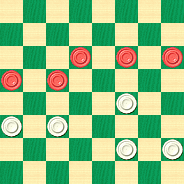
WHITE
White to Play and Draw
W:W19,21,22,27,28:B10,11,12,13,14.
In the Ency. 3rd Ed. Page 268, Note S. the above Pos. occurs. 27-24---A, 11-16, 22-18, 14-23, 24-20. A---28-24, 11-15---B, 27-23, 13-17. B. W. B---11-16, 27-23, 16-20, 22-18 drawn.
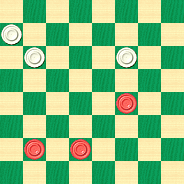
WHITE
Black to Play, White Draws
B:W28,24,22:B14,8,7.
Prob. 105 in Gould's by Grant and McGuire. 7-11, 24-19, 8-12, 28-24, 11-16, 22-18*, 14-23, 24-20. Drawn.
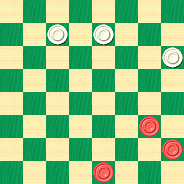
BLACK
Black to Play and Draw
B:W27,26,21:B9,5,2.
Prob. 229 in Draughts World, Vol. 4, page 492. by "P. B." 2-7, 27-23, 7-11, 23-19, 9-14, 26-22, 5-9, 22-17, 11-15, 19-10, 9-13.
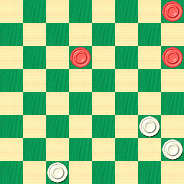
WHITE
White to Play and Draw
W:W24,28,30:B4,10,12.
Prob. 230, also in D. W., Vol. 4, page 492, by A. J. MacDonald. MacDonald shows how it can come out of a game. Editor's note: Ben Boland didn't give the solution. It's 30-26 10-15 26-23 4-8 24-20 15-19 (8-11 loses by 23-19 15-24 28-19 W. W.) 23x16 12x19 20-16. Drawn.
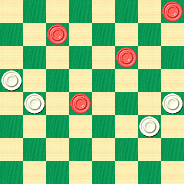
WHITE
White to Play and Win
W:W13,17,20,24:B4,6,11,18.
Prob. 515 in Gould's by D. Gourlay (1880) shows the idea. 17-14, 4-8, 24-19, 18-22, 14-9*---A, 6-10, 19-16, etc. White wins. A---19-16, 6-10, 14-7, 8-12. Drawn.
You can email the Webmaster with comments on this article.
